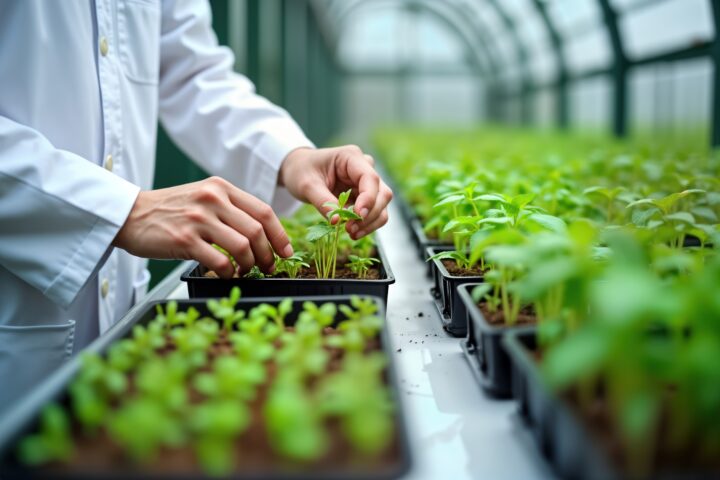
No Pig Business: Why Testicle-Free Boars Are a Clear Win for Animal Welfare
New breeding methods are opening up new possibilities in both plant and animal breeding. They allow targeted genetic changes that can make animals more resilient, adaptable, and healthier.
Tuesday, November 4, 2025
No one wants to eat pork chops that smell like boar taint. That’s why male piglets are currently castrated shortly after birth. In Switzerland, this affects hundreds of thousands of animals every year. The procedure is anything but ideal from an animal welfare perspective: it’s painful for the piglets and costly for farmers.
It’s therefore no surprise that the industry is looking for alternatives. One of them involves a genetic intervention. In Germany, researchers recently succeeded in breeding pigs that do not develop male sexual organs, as reported by NZZ am Sonntag. The benefits are obvious: the piglets are spared the painful removal of their testicles because they never develop any in the first place.
Does this mean such pigs will soon appear in Swiss barns? Of course not. In Switzerland, plants and animals produced using genetic engineering are still banned. The genetic engineering moratorium continues to apply to so-called “new breeding techniques,” such as CRISPR-Cas, which was used to produce these testicle-free boars.
At present, the federal government is working on fulfilling a parliamentary mandate to allow the use of new genomic techniques in plant breeding. However, the Federal Council’s current proposal is too restrictive to attract investment. Many consultation responses have pointed out these weaknesses, so it remains to be seen whether and how the proposal will be revised. One thing is clear: animals will not be included. Testicle-free boars remain science fiction for now.
From the anti-genetic engineering camp, the message is clear: resist from the start — first plants, then animals. But would that really be so bad? Targeted interventions could help reduce animal suffering — by making animals more resistant to disease or by making painful procedures like dehorning or castration unnecessary. They could also help adapt livestock to climate change, for instance by producing cattle that better tolerate heat, experience less stress, or emit less methane.
From Pain Prevention to Species Protection
The position of the International Union for Conservation of Nature (IUCN) is also noteworthy. The IUCN — the world’s leading conservation body, with over 1,400 members from more than 160 countries — recently spoke out against a blanket ban on genetically modified organisms in conservation. Instead, it advocates for science-based, risk-assessed evaluation. This means that projects aiming to save endangered species through biotechnology or gene-editing approaches can be supported.
It’s also worth noting that new genetic techniques are already used in human medicine — for example, to treat severe hereditary diseases such as sickle cell anemia or beta-thalassemia. These genomic therapies make it possible to correct defective genes, and patients report significantly improved health and quality of life — an impressive demonstration of the potential of these technologies.
All these examples from plant breeding, animal breeding, and human medicine show that technologies capable of resolving conflicts and delivering genuine improvements will prevail — because it makes sense to use them. Let’s hope the Federal Council keeps that in mind when finalizing its upcoming legislation on new plant breeding technologies.
Sources
Testicle-Free Boars: Swiss Pig Farmers Lobby for the Controversial Gene-Editing Tool
Livestock: Traditional Genetic Engineering Is Outdated, but Genome Editing Brings New Momentum
swiss-food.ch – New Genomic Technologies Can Help Save Endangered Species
Gene Therapy Improves Quality of Life for Patients with Sickle Cell Disease and Beta Thalassemia
Kindly note:
We, a non-native editorial team value clear and faultless communication. At times we have to prioritize speed over perfection, utilizing tools, that are still learning.
We are deepL sorry for any observed stylistic or spelling errors.
Related articles

Cool thanks to Caribbean genes: the heat-defying calf!
Cows are also suffering from global warming. Hot temperatures have a negative effect on their metabolism. Now, the first solutions are emerging: for example, Strickhof in Lindau is home to one of the first Slick gene cows in the world. These are more heat tolerant than conventional cows and can therefore withstand global warming.

Science demonstrates the concrete benefits of new breeding methods
The Swiss Academy of Sciences (SCNAT) recognizes the significant opportunities offered by new breeding methods. In a new dossier, the Academy presents five examples of crops cultivated using genome editing, which have high potential for Swiss agriculture. This publication emphasizes the scientific consensus on the use of genetic scissors. The new breeding methods offer numerous advantages for the environment and agriculture.

How NZT makes popular varieties more resilient
New breeding technologies offer solutions – but they are simply being ignored in the current debate. Anyone who complains about the lack of flavour in strawberries must also be prepared to accept modern methods such as genome editing.

What’s Really in Your Shopping Basket
Genetic engineering in our shopping basket? Yes – and much more often than we think. Whether it’s pasta, bread or vegetables: many of the everyday products we consume come from mutation breeding, which involves altering the genome and is considered safe. It’s high time to debunk the common myths.

Genomic breeding methods are not given a chance to prove themselves
Modern genomic breeding methods are legally classified as genetic engineering – and are therefore still effectively blocked. Yet we have been eating genetically modified plants for decades, just under the label of “classical mutagenesis.” The new, more precise techniques are regulated more strictly than the old ones, even though they are considered safer from a scientific perspective. A contradiction that urgently needs to be corrected. The EU is setting a good example.

Stagnation instead of progress: Switzerland risks falling behind in new breeding techniques
An overview article in Schweizer Bauer shows how much the new breeding methods are preoccupying farming circles. Once the consultation process on the federal law has been completed, a bill is expected – then it will become clear whether there is actually the political will to approve it.

Biotechnology has only just begun
When Frank Schirrmacher cleared the pages of the Frankfurter Allgemeine Zeitung's arts section on 27 June 2000 to publish the human genome, which had just been deciphered for the first time, letter by letter over six pages, biotechnology came to the attention of the general public for the first time.

